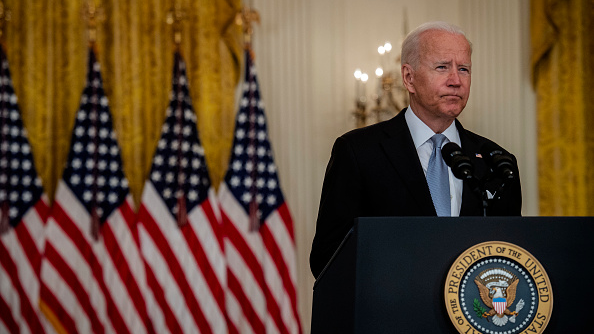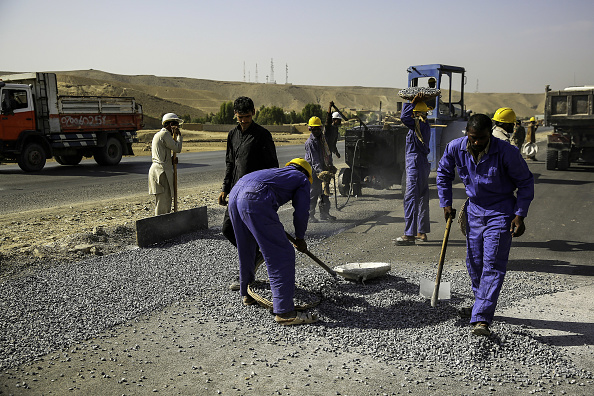
U.S. President Joe Biden delivers remarks on the situation in Afghanistan in the East Room of the White House, August 16, 2021. /Getty
U.S. President Joe Biden delivers remarks on the situation in Afghanistan in the East Room of the White House, August 16, 2021. /Getty
Editor's note: William Jones is a Washington policy analyst and a non-resident fellow of the Chongyang Institute for Financial Studies. The article reflects the author's opinions and not necessarily the views of CGTN.
The rapidity with which the Taliban retook Afghanistan came as a shock to the world. The fact that the Taliban would again re-emerge, probably as the dominant force in Afghanistan, was fairly clear at the point that President Joe Biden set the date for the pullout of the U.S. troops. For the U.S., Afghanistan was the longest experiment in the history of its elusive endeavor of "democracy building" – and it failed miserably.
The world is now waiting – with bated breath - to see the direction the Taliban will take as they consolidate their hold on the country. The statements by their spokesmen indicate that there will be no retaliation against those who had placed their hope in the U.S. assistance, and they have indicated that they want a good relationship with the outside world. Their previous record, however, tells a different story and it is with great anticipation that the world awaits what next steps they will take.
But the Afghan story does have one clear conclusion: namely, that the U.S.'s attempts to remake the world in its own image and in accordance with its dictates are not going to work. The amount of American blood and treasure that went into the "Afghan experiment" has proven to be a tremendous waste. Given the anger at the U.S. government for pursuing a policy that ended in such a ruin, there might be no support for continuing any such endeavor again, in Afghanistan or anywhere else. It still remains to be seen what real political consequences will be for the Biden administration in conducting the pullout without realizing the total vacuum that would be left behind – to be filled by the Taliban.
Even the U.S.'s "alliance of democracies" will be wary of getting involved in such endeavors in the future. The UK, whose role in Afghanistan has been more extensive – and murkier – than any other political force over the centuries, is expressing a certain amount of schadenfreude over the predicament that "Yanks" have gotten themselves into. And the Brits no doubt have other schemes in dealing with this "graveyard of empires," in which they have spent so much time and energy.
Whatever direction the Taliban take, the world community, particularly countries in the region, has an important role to play. What is needed is a new paradigm of cooperation between nations, no matter whether they fit the category of "democracy" defined by the U.S. or not. The major powers, the U.S., China, Russia and India, must now begin to work together with the other countries, including important neighbors of Afghanistan and Iran, in order to create a regional neighborhood that can help create the "space" for a Taliban-dominated nation to move in a more positive direction – for the Afghan people and for the world.
And that means the familiar geopolitical games surrounding the country must come to an end. Only if Afghanistan is brought into the world community can it develop as a nation, implementing major projects. For example, the China-Pakistan Economic Corridor projects might be extended to Afghanistan.

Workers and machines on the construction site of Torkham-Jalalabad highway expansion project in Nangarhar Province, Afghanistan, October 19, 2016. /Getty
Workers and machines on the construction site of Torkham-Jalalabad highway expansion project in Nangarhar Province, Afghanistan, October 19, 2016. /Getty
Currently, roads and highways are sorely lacking in the country, not to mention rail transport, which is practically non-existent. Water and electricity are also scarce in most of the country. All of these could not be provided except through international cooperation. So the political games, which have been played by the U.S. and its "allies" in an effort to curtail the economic development of China and Russia and to reassert their "hegemony", have got to stop.
While differences will remain, the major countries, each in their own way, have recognized the fundamental value of human life. Civilization has developed in many different cultures, and has also been fundamental to the Islamic faith that the Taliban professes. In this context, the differences in political and social cultures must not become the reason for political divisions. If we can take this fundamental commitment to the sacredness of human life as the basis for cooperation with Taliban-led Afghanistan, this notion may perhaps also rub off on them. Regardless of the outcome, it is only such a coalition of the international community, united around the commitment to preserving human life, rather than the U.S.-led "alliance of democracies," that can shape a humanistic future for the Afghan people.
(If you want to contribute and have specific expertise, please contact us at opinions@cgtn.com.)

